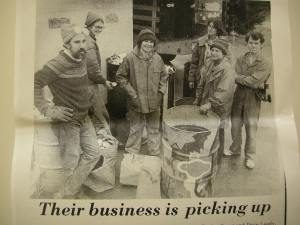Posts Tagged ‘recycling’
Recycling centers: the old days
 Rummaging through my old black filing cabinet, I came across an article I wrote in 1972 about recycling centers that was published in my Christchurch, New Zealand paper. These days, when everything recyclable gets dumped into the Blue Bin and carted away, I though it might be fun to read about the beginnings of the movement.
Rummaging through my old black filing cabinet, I came across an article I wrote in 1972 about recycling centers that was published in my Christchurch, New Zealand paper. These days, when everything recyclable gets dumped into the Blue Bin and carted away, I though it might be fun to read about the beginnings of the movement.
COME ON DOWN TO THE RECYCLING CENTER
Cupertino, CA
Spurred on by their ecology-minded kids, Californian families these days are loading up the station wagon at weekends with squashed cans, bottles, aluminum foil, and old newspapers, and heading for the local recycling depot.
The movement started a few years ago, when beer manufacturers discovered that they could earn bonus points in public relations by buying back and recycling the aluminum beer cans that had become an inevitable part of the landscape of the nation’s beaches and parks. As concern for the environment became a national obsession, clean-up campaigns became a fashionable, and profitable, project for youth groups.

A 1970s recycling center. Image from Bainbridge Island, WA Community Cafe
Then the kids started taking over the collection depots. Each summer, high school social studies departments set up their own recycling centers. Sometimes the logistics of getting students organized can be overwhelming. One summer the boxes and bottles piled up embarrassingly high in the parking lot of a local supermarket before the kids from the high school across the road got themselves coordinated. And last year student apathy on the prestigious Stanford University campus allowed the recyclable trash to spread like a slum over the elegant grounds.
But a well-run recycling center can be a pleasure to visit. A Los Altos youth group set up shop in the grounds of an abandoned school. Every weekend enthusiastic volunteers were there, sorting, packing, stacking. Cheerful hand-lettered signs directed customers to the right cardboard carton for each item, and warned about the broken glass on the ground. One member invented an ingenious wooden lever for pressing the cans as flat as can be, and this is always in use, though most families now bring the stuff in already sorted and squashed. “Doing your bit for ecology’ has become an acceptable chore for children, and there is a therapeutic value in bashing cans nearly comparable to chopping firewood, back in the good old days before central heating and all-electric kitchens.
Some local government projects have fared less well. Neighboring Sunnyvale’s municipal recycling center is a lonely outpost in the corner of the city dump, way down in the swamp beyond the aerospace plants and the defense installations. Not surprisingly, the center made a loss last year.
Cupertino has tried to get the best of both worlds. The local chapter of Jaycees, supported by the city, the college administration, and the students’ Ecology Corps, has set up a recycling depot in a corner of the beautiful, and central, De Anza College grounds. It is less chaotic than the Los Altos center: a neat redwood fence surrounds the area, and the materials are contained in big steel skips. But there is still the sense of community involvement, the cheerful bustle on a Saturday morning, the satisfying clunk of bottles smashing into the skips. First quarter earnings showed a modest profit. The glass and aluminum are bought back by their respective manufacturers, and the tin and bi-metal go to a local producer of nursery pots.
Some recycling centers take newspaper, which is now reused for a variety of items, from dinner napkins to stationery. But the youth club paper drive, long a part of American life, takes care of most of this, and the big brown newspaper skip on the local school grounds is a familiar part of the landscape.
What about the future? Development suggestions have included a return to the regular garbage collection, with automatic sorters at the dumps to pick up reusable materials. The idea sounds more efficient, more appropriate to industrial America. But somehow it doesn’t quite fit the new environmental consciousness, with its emphasis on individual effort. And it won’t be nearly so much fun.